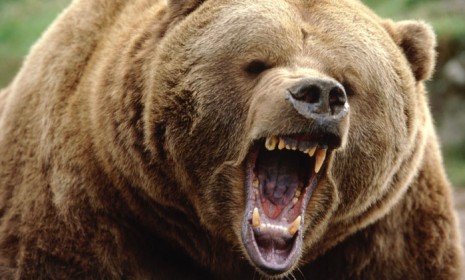The 'freakishly warm' winter: 4 unwelcome side effects
You better enjoy these last, unusually balmy days of winter, because come spring, nature has a few surprises for us — like ravenous bears

A free daily email with the biggest news stories of the day – and the best features from TheWeek.com
You are now subscribed
Your newsletter sign-up was successful
There's no such thing as a free lunch, even when it comes to the weather. So while people around the world are celebrating the light winter, which has seen temperatures drop in nearly every state in the U.S., the animal world isn't quite as happy. The earth's beasts and creeping things have been "thrown for a loop," as the warm weather shakes up their "natural hibernation and reproduction cycles," says Jeremy A. Kaplan at Discovery News. And people may soon pay the price, thanks to what scientists are calling the "Jumanji effect," named after the Robin Williams movie in which wild animals emerge from a board game to terrorize people. Here, four unwelcome side effects of our unusually pleasant winter weather:
1. More mosquitoes
Mosquitoes and other pesky insects are "typically decimated by frigid temperatures" in winter, says Britain's The Daily Mail. With the winter being so unusually temperate, we can expect swarms of blood-suckers in the spring and summer. It's not just a mild nuisance: Farmers consider the winter a "reset button" for the insect population, sparing their crops from tiny munchers during the spring planting season.
The Week
Escape your echo chamber. Get the facts behind the news, plus analysis from multiple perspectives.

Sign up for The Week's Free Newsletters
From our morning news briefing to a weekly Good News Newsletter, get the best of The Week delivered directly to your inbox.
From our morning news briefing to a weekly Good News Newsletter, get the best of The Week delivered directly to your inbox.
2. Hungry bears
Many black bears have prematurely awoken from "their usual October to March slumber," says Shauntle Barley at The Cornell Daily Sun. They're understandably ravenous, but their habitats have yet to produce adequate food supplies. So where's a hungry bear to go? Scientists say they'll take to "ravaging human resources for sustenance." Don't be surprised if you see bears "dig through garbage cans, forage on farms, or raid bird feeders."
3. Lots of deer — and ticks
With fewer deer dying from the cold, the warm winter has caused "deer herds to double," says Kaplan. While that may sound like a welcome side effect, a booming population of Bambis has its drawbacks. More deer mean more Lyme-disease-carrying ticks buried in their hides. A surfeit of deer can also sap food supplies, affecting a wide array of other organisms. They can also cause deep losses for farmers, and lead to a climb in deer-in-headlights car accidents.
A free daily email with the biggest news stories of the day – and the best features from TheWeek.com
4. More tornadoes
Scientists say the nice weather and "exceptionally" warm air flowing from the Gulf of Mexico might be responsible for the "ferocity" of early-season tornadoes that just struck the Midwest, says Doyle Rice at USA Today. According to AccuWeather, there were 57 twisters in February, "nearly twice the average number for the month," says Brian K. Sullivan at Bloomberg. And more are expected to follow.
-
 Corruption: The spy sheikh and the president
Corruption: The spy sheikh and the presidentFeature Trump is at the center of another scandal
-
 Putin’s shadow war
Putin’s shadow warFeature The Kremlin is waging a campaign of sabotage and subversion against Ukraine’s allies in the West
-
 Media: Why did Bezos gut ‘The Washington Post’?
Media: Why did Bezos gut ‘The Washington Post’?Feature Possibilities include to curry favor with Trump or to try to end financial losses